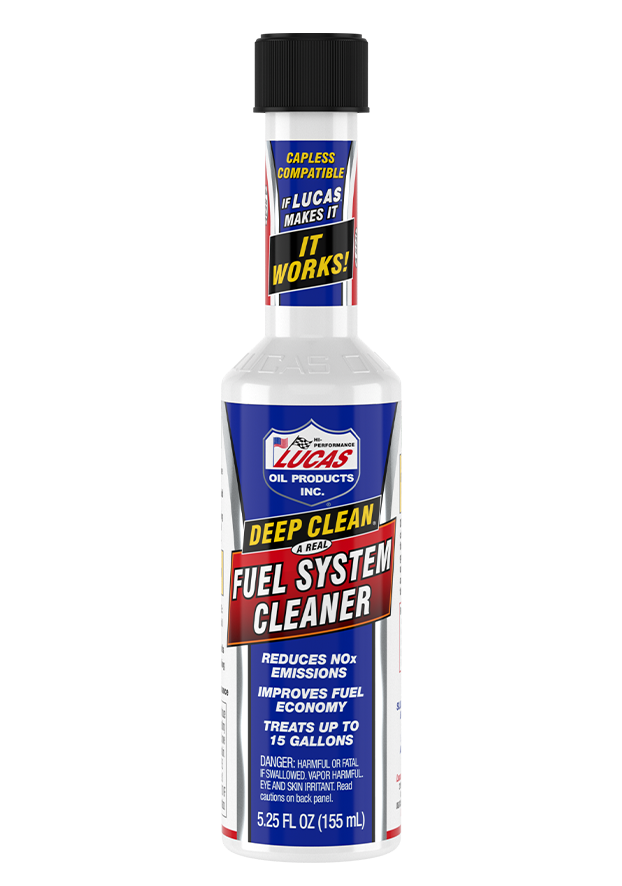
Why choose Lucas Oil? Simple answer, because it works! More advanced answers below.
synthetic oils
Pure synthetics use high-quality base oil, which is like having an incredibly strong foundation in order to build a high performance lubricant. One aspect of higher quality base oil is thermal conductivity. This means the fluid has a greater capacity to absorb heat which it can then transfer to a cooler area. This allows the lubricant to pull heat from high temperature areas like the lifter and camshaft interface or from the highly loaded connecting rod bearing and transfer this heat to an oil cooler or to the sump where it can be conducted to cooler outside air. This allows a synthetic to operate at a much lower overall temperature, which means the oil will last longer. Combined with a more refined additive package that also lasts longer, this means that while a pure synthetic is more expensive, it is possible to extend drain intervals so that over a greater number of competition laps or street miles, a synthetic can be less expensive to use than a mineral-based oil.
The word “synthetic” has many different meanings depending on the context. In the lubricants industry the word is usually referencing the base oil – the starting point for building a lubricant which constitutes the majority of the finished lubricant. Base oils are what you begin with before various additives and viscosity modifiers have been compounded into the base oil. There are different kinds of “synthetic” base oils. The American Petroleum Institute (API) categorizes lubricating base oils into 5 distinct “groups.” Group I and II are petroleum based. Group III is considered synthetic but is a refinery product, commonly obtained from wax through severe hydro-isomerization. This is a high-temperature reaction where hydrogen gas is used to rearrange the molecules over a catalyst. Group IV is polyalphaolefin (PAO for short). This is a kind of base oil obtained by polymerization of a monomer like decene into a larger molecule. PAOs were the first base oils that used the “synthetic” description. Then there are Group V base oils, also considered synthetic which really is everything else, including: esters, silicone oils and polyalkylene glycols (PAG). Lucas uses all of these categories of synthetic base oils depending on the application.
Synthetics have certain advantages over standard petroleum base oils. They can be thought of as molecules that are designed for ideal performance. Synthetics have higher resistance to heat and oxidation. They have lower pour points, which means they remain liquid at extremely low temperatures when petroleum base oils would become gels. They also have a higher viscosity index than petroleum base oils, which means that they thin less as they are heated. Due to their purity, they are generally perfectly clear, almost like water. All of these performance characteristics do come at a price of course, but racing oils and other severe applications call for this higher degree of performance.
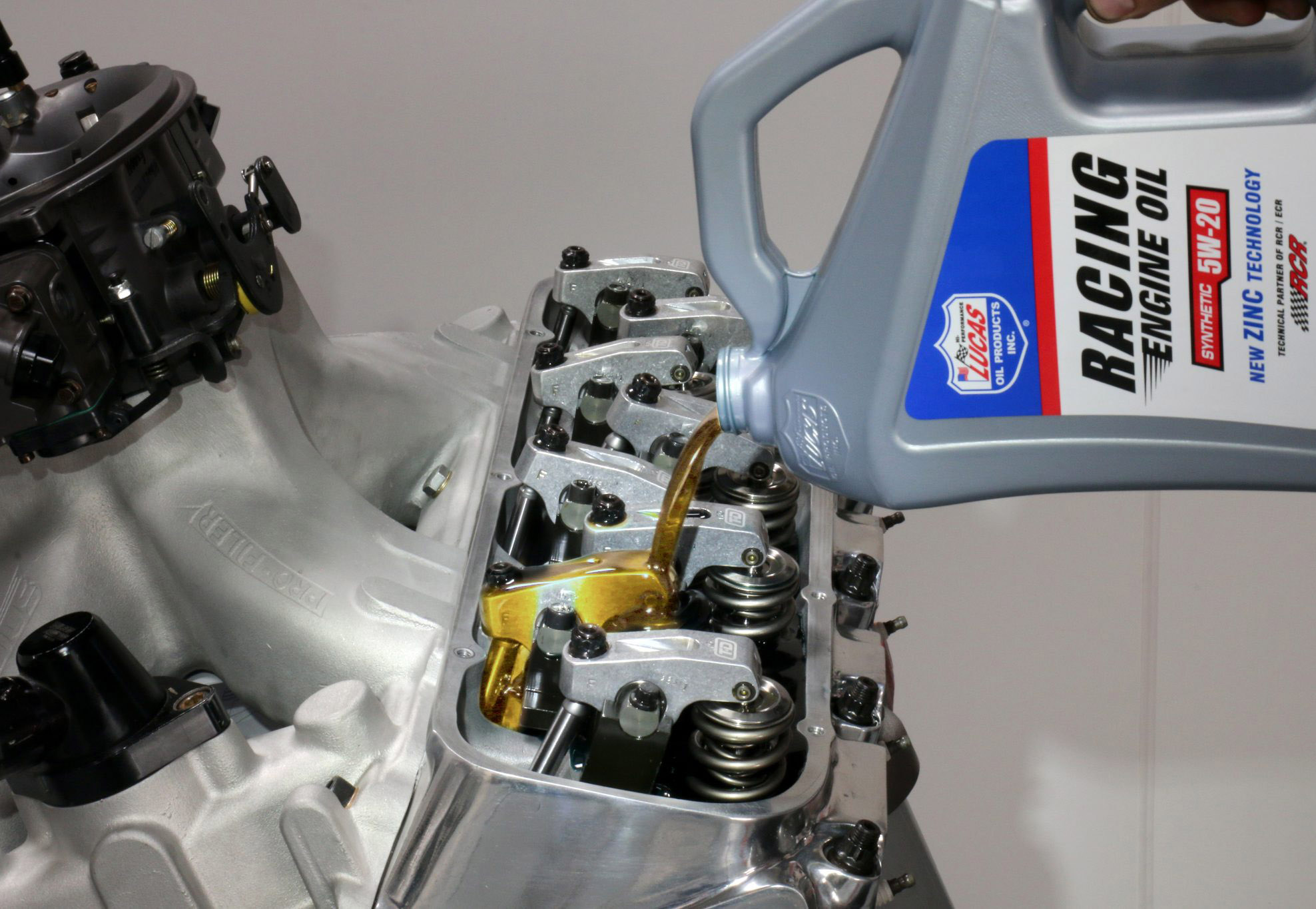
Discussing engine oil is a slippery subject. For starters, should you use conventional or synthetic oil? It used to be that the most troublesome choice to make when deciding on oil for your engine was the brand name on the label. But today much has changed. There are multiple technical areas and a ton of material to cover so let’s jump right into this viscous topic.
Technology around engine oil is constantly changing because late-model engines are evolving at a much quicker pace than in past decades. The discussion of conventional versus synthetic has been extensively covered. So instead, we’ll focus on oil application issues and how viscosity plays a part in that decision. To get some solid information, we reached out to the folks at Lucas Oil.
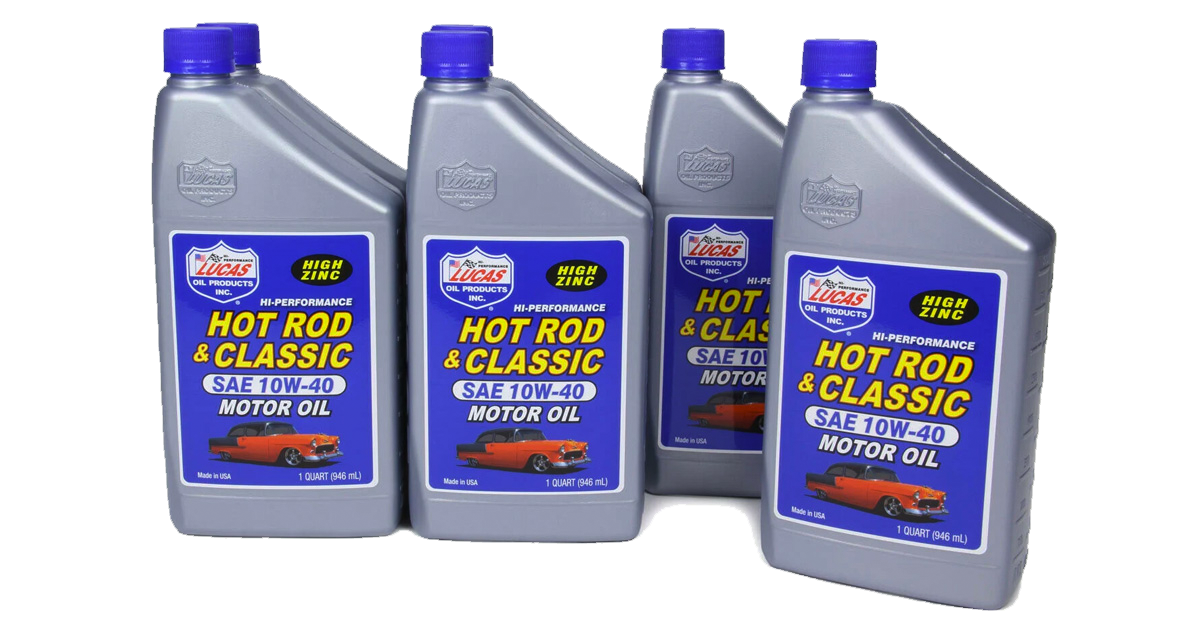
Why Choose Racing Oil?
Racing oil offers distinct advantages over normal API oils that are now limited in their use of ZINC and phosphorous, commonly referred to as ZDDP (ZINC dialkyl dithiophosphate). This is essentially a high-pressure lubricant that coats high-load areas of the engine such as the interface between a flat tappet lifter and the camshaft lobe. In current API SN engine oils, ZDDP has been drastically reduced to prevent long-term damage to catalytic converters. But since race engines do not commonly utilize emission control devices, ZDDP and other additives can be blended to increase protection for critical components in high performance engines.
Additive packages for racing oils can also be adjusted to enhance oil performance. As an example, API oils increase detergent levels to reduce the chance of sludge deposits and other daily use considerations in order to increase drain intervals. But high detergent levels are also counterproductive since they also work to remove the high pressure lubricants that race engines demand for protection under extreme load and RPM conditions. Lucas Racing Oil carefully blends these additives to produce an optimal balance for competition and high performance engines like yours. Lucas offers a wide selection of different base oil selections ranging from mineral-based, through semi-synthetic blend, to full synthetic in various viscosities which offer the opportunity to customize the perfect lubricant for your specific needs.
You’ve invested thousands of dollars in building the perfect engine and it deserves oil that will not only protect it but also complement its performance characteristics.
“LUCAS OIL PROVIDES ECR ENGINES A COMPETITIVE ADVANTAGE IN THE NASCAR AND ROAD RACING SERIES WHERE WE COMPETE. INDEED, RICHARD CHILDRESS RACING AND OTHER TEAMS RUNNING ECR ENGINES HAVE WON MULTIPLE RACES PROTECTED BY LUCAS OIL. LUCAS UNDERSTANDS THE UNIQUE REQUIREMENTS TO ACHIEVE POWER AND DURABILITY IN HIGH-PERFORMANCE ENGINES. THROUGH OUR LUCAS/ECR TECHNICAL PARTNERSHIP WE ARE CONTINUING TO DEVELOP NEW BLENDS SUITED IDEALLY FOR DEMANDING APPLICATIONS.”
additives
Any engine oil, intended either for street use or as a race lubricant, is a combination of both a base oil (either mineral-based or synthetically derived), and an additive package. You can think of the base oil as a foundation for a house, while the additive package is more like the framework and trim around which the rest of the house is constructed. Both are essential and work together to produce the final product. The base oil foundation interacts with the additive package to create the oil’s overall performance curve. For example, viscosity index is a base oil trait but its performance can be enhanced with viscosity improvers. Other additives such as anti-foam, anti-corrosion, anti-wear agents (ZDDP), and oxidation stabilizers all contribute to this additive package which improves the base oil’s ability to lubricate, reduce wear and help cool the engine.
New, highly-purified lubricants called polyalphaolefins (PAO) are used to create pure, Grade IV (4) synthetic base oil. This higher quality oil creates a stronger base package mainly because it offers a much higher thermal stability. Because of this, PAO base oil foundations require a less complex additive package which further extends the oil’s performance envelope. Due to these strengths, PAO base oils are able to extend the performance envelope of their additive package over a longer period of time, especially when subjected to high temperatures. Lucas synthetics’ superior base oil strategy reduces the necessity for more complex additive packages, creating a more stable oil package where the additive package will last longer. This is what contributes to maintaining superior performance over time, which equates to longer drain intervals.
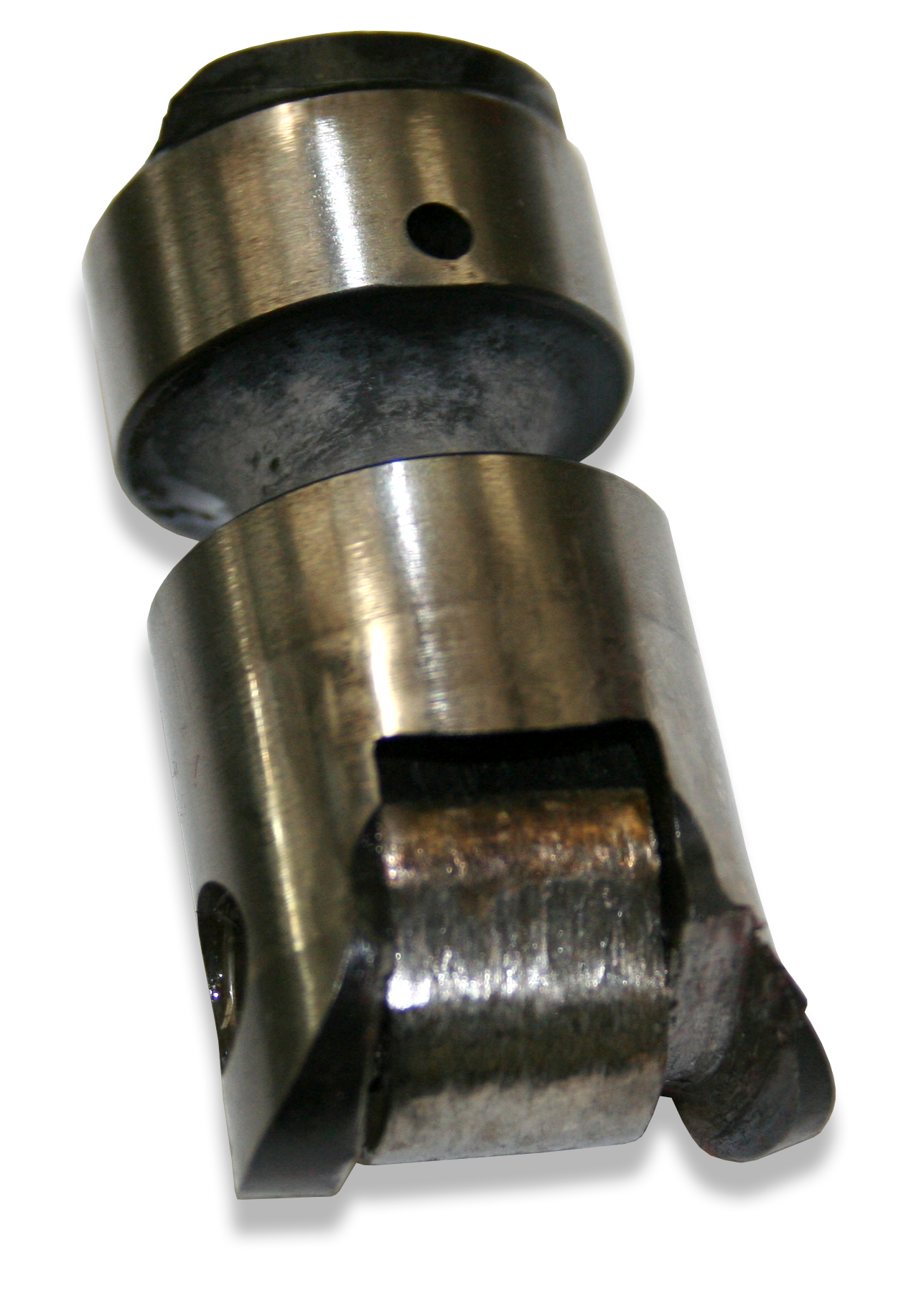
WORN ROLLER LIFTER
Roller lifter failure can occur when oils lack in “Extreme Pressure” additive packages, such as ZDDP. As the needle bearing fails, the roller wheel with fail too. This is especially critical in flat tappet cams as well.
GOOD ROLLER LIFTER
Roller lifters work well with the correct additive package and oil. Proper valve lash is also critical.
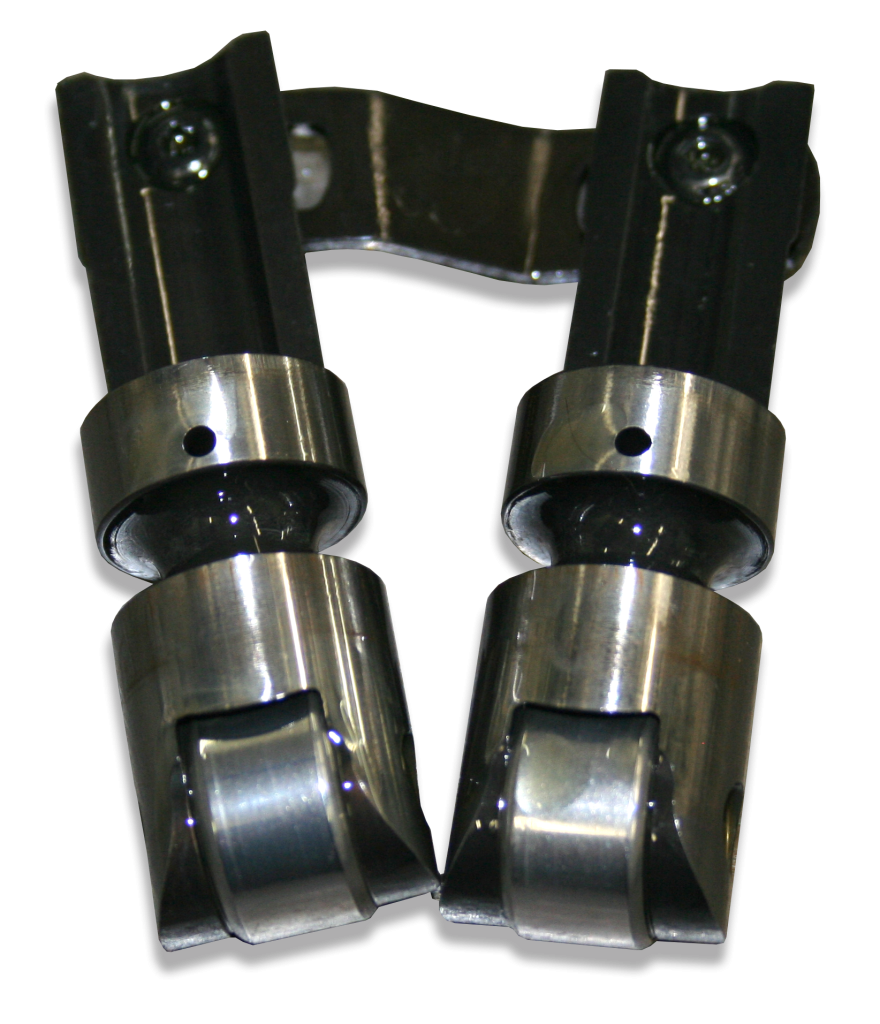
ZDDP
ZINC dialkyldithiophosphate, (ZDDP for short or sometimes even just “ZINC”) are a family of multi-functional additives that provide anti-wear, oxidation inhibition and corrosion protection. In recent years the level of phosphorus in passenger car motor oils (PCMO) has been limited by the American Petroleum Institute (API) and the International Lubricants Standardization and Approval Committee (ILSAC). This is due to the tendency of phosphorus to interfere with the function of catalytic converters. One will hear of phosphorus referred to as a “catalyst poison.” A small amount of motor oil is inevitably burned by the engine and this is how phosphorus contaminates the catalyst in the converter. As the engine ages more oil tends to be burned, accelerating this process, shortening the useful life of the catalytic converter. Oil blenders, recognizing the unique value of ZDDP, have strenuously argued against lowering the limits further. Racers and car hobbyists have long recognized the value of motor oils that have high ZDDP concentrations, especially in protecting the camshafts of older cars that do not use roller bearing followers. In these engines there is a great deal of sliding friction as the lobes of the camshafts push down on the tappets/ followers of the valve train. Oils high in ZDDP are very useful in extending the life of the camshafts and associated valve linkages. ZDDP works by forming a sacrificial film between moving metal parts that is continually formed and continually stripped away through friction. This film formation also figures in the corrosion inhibiting function of ZDDP. Reducing ZDDP from oil often involves replacing ZDDP with three new additives for each of the three functions ZDDP serves.
DETERGENTS AND DISPERSANTS
Combustion in the engine results in the formation, not just of heat and power, along with carbon dioxide, water and other gases, but also carbonaceous, sooty compounds as well as weak organic acids. Detergents are alkaline additives that neutralize these weak acids and bind to them, helping to keep them suspended in the oil and not agglomerate to thicken the oil or form lacquers on metal parts. Detergents are often the calcium or magnesium salts of organic acids themselves and are frequently “over-based” meaning that they have additional basic content beyond the simple organometallic salts to neutralize additional acidic byproducts of combustion. They’re relatively small molecules. Detergents often have a dual function of cleaning and inhibiting corrosion. Dispersants serve a similar function to detergents, but they are generally far less alkaline and are larger, polymeric molecules whose function has more to do with dispersing and holding contaminants in solution and suspension than in neutralizing them. Engine oils of all types, whether for passenger cars or race cars, need a balance of components. High levels of ZDDP without sufficient detergents and dispersants can actually lead to gum and sludge formation. Racing oils will have a different balance than passenger car oils, but they too need detergents and dispersants as well as anti-wear agents, extreme pressure lubricants, oxidation inhibitors and corrosion inhibitors.
Each product offered in the Lucas Racing Engine Oil line employs a unique combination of chemical components. That’s why this catalog lists so many different styles of engine oil. Of the many important components of a motor oil’s additive package, one plays a pivotal role, a class of compounds often abbreviated as “ZINC” or “ZDDP.” This material actually bonds to the surface of the metal under pressure and by doing so enhances the base oil’s antiwear characteristics. All of this must be carefully blended when the additive package is created, which is why pour-in ZDDP additives are not as successful as additives blended at the source. Lucas scientifically controls the point at which ZINC Technology is applied, introducing just the right amount of additive to protect your engine because excessive ZINC and phosphate levels can do more harm than good. That’s why each custom-blended Lucas Racing product is specifically designed for its intended application – and to help you not only maintain your precious investment – but create an environment that allows your engine to do its job. You can’t ask for more than that.
BUSINESS & BEYOND WITH GERRY DICK: mORGAN lUCAS
Morgan Lucas’ connection with cars and racing runs deep within his DNA. Although he has retired from racing, he continues to pursue his passion for speed by spearheading the expansion of his family’s business. As the president of Lucas Oil Products, he candidly discusses his views on risk, family, and the company’s strong commitment to Indiana.
LISTEN TO PODCASTpREVENTATIVE MAINTENANCE
Keep Your Engine Running Clean and Efficient with Lucas Oil Fuel System Solutions
At Lucas Oil, we know that a clean and efficient fuel system is essential for optimal vehicle performance, fuel economy, and emissions reduction. That’s why we’ve developed a comprehensive lineup of fuel system products designed to meet the needs of every driver. Whether you’re looking for everyday maintenance, a deep system reset, or a powerful emissions solution, Lucas Oil has the right solution for you.
Why You Need Fuel Treatment
It’s a simple and cost-effective solution to keep your vehicle running smoothly and efficiently, tank after tank.
Which Fuel System Product Do You Need?
| Product | Key Benefits | Ideal Use Case |
| Fuel Treatment | Everyday preventative maintenance | Use regularly to enhance engine life, avoid expensive repairs, and smooth daily driving performance. Go farther with every fill up. |
| Deep Clean | Intensive fuel system cleaning | Use to reset fuel system performance, address poor fuel quality, and improve fuel efficiency. One Bottle. One Tank. One Powerful Clean. |
| Emissions Clear | Emissions system clean-up | Use before emissions inspections, to improve emissions and restore emissions system efficiency. |
When to Use
By incorporating these products into your regular vehicle maintenance, you’ll ensure your vehicle operates at peak efficiency, saving you money on fuel and costly repairs while minimizing your environmental impact.
Take the first step towards cleaner emissions, improved fuel economy, and a longer-lasting engine. Explore our full line of fuel system products and find the perfect solution for your vehicle.
Preventative Vehicle Maintenance that Anyone Can Do – The Benefits of Using Additives Regularly
Vehicle maintenance is something most of us have to deal with. For many, it is a labor of love: bringing a classic back to its prime or keeping a family auto in tip-top shape for teenagers and their siblings to share. Confident DIYers are comfortable popping the hood and getting grease under their fingernails. For most, regular maintenance is left to the professionals.
Whether you consider it a joy or a chore, regular vehicle maintenance is crucial to ensuring the reliability, safety, and utility of a car, truck, van or SUV. We rely on these machines to transport us through daily life, and keeping them running smoothly takes the same care we give to our homes and ourselves.
But you don’t have to be a gearhead or spend hundreds of dollars at the auto shop tearing down and cleaning an engine, there’s a much easier way to care for a vehicle that everyone can do: use fuel additives.
Lucas Makes Vehicle Care Easy: Fill It Up, Pour It In and Drive
It sounds too simple, but fuel additives like Lucas Oil Fuel Treatment can do a lot to improve engine performance and efficiency in gas- or diesel-powered vehicles. Fuel Treatment is a powerful blend of lubricants and cleaning agents designed to de-gunk a fuel system and flush out nasty deposits that build up in an engine – it’s like a multivitamin for your vehicle – circulating through the system delivering benefits to critical components.
Just as multivitamin provides essential nutrients to our bodies, fuel additives can provide numerous advantages to our vehicles when added regularly. Think of additives as a daily dose of vitamins that can help keep your vehicle running at its best.
Why Use Fuel Additives Regularly – The Multivitamin Effect
Additives are the multivitamin for car health, with different blends benefiting different parts of a vehicle’s engine and performance. Fuel system cleaners can help keep the fuel lines, injectors and combustion chambers clean, while octane boosters improve power and acceleration, and fuel stabilizers keep fuel fresh and prevent gumming and buildup.
To kickstart your vehicle multivitamin regimen, start with Fuel Treatment. It’s an easy-to-use, comprehensive product that is great for novice car owners and enthusiasts and offers real benefits for your vehicle and wallet. Just pour in one 5-ounce bottle once a month or every other time you fill up your gas tank.
- Cleans fuel system. Adding a fuel additive every other time you fill up will help prevent deposit buildup and flush out existing deposits.
- Cleans engine. Fuel additives like Lucas Fuel Treatment do an excellent job of cleaning internal components without the need to break down an engine.
- Improves fuel efficiency. A good fuel additive will maximize every drop of gas in the tank, burning more completely and efficiently, leaving nothing behind to corrode or gunk up your fuel system. The more efficiently your vehicle is able to use fuel, the more miles you can go on a single tank.
- Avoid trips to the auto service shop. Maintaining a clean fuel system and engine can prevent a number of performance or reliability issues. Friction, heat, wear and tear can wreak havoc on new and old engines, a major cause of engine failure that requires a costly rebuild or replacement. Fuel and oil additives, especially those with added lubrication like Lucas Upper Cylinder Lubricant and Stabilizer, effectively reduce engine friction and prevent common engine wear issues. Lucas in the tank, money in the bank.
Curious about how often you should use fuel additives in your vehicle? Think of additives like multivitamins for your car. If you use them regularly you maximize their benefits – and for your vehicle that means better engine performance, lower emissions and fewer trips to the service station. Try adding Lucas Oil Fuel Treatment to your fuel with every other fill up and watch how your vehicle responds. We think you’ll be impressed.
When it comes to taking the best care of your vehicle, try Lucas first.
A SIMPLE GUIDE ON HOW TO GET THROUGH THE TEENAGE YEARS OF YOUR VEHICLE
By Ford McAlexander, Sales Programs Manager, Lucas Oil Products, INC.
It may be surprising to hear after the many new car commercials and advertisements we see everyday, but in truth, vehicles are growing older. With that being said, it is probably time for everyone to have a heart-to- heart with their vehicle to ensure it receives the best protections available to them. I may joke about talking to a vehicle regarding its well-being, but this is important not only for reliability and performance, but for the owner’s wallet as well.
According to multiple sources and the Bureau of Transportation studies, the average vehicle in operation on the road today is at least 11 years old! That’s almost a teenager! As one can expect from teenagers, they eat through a lot of the products as they grow. This will bring about growing pains, and I’m not talking about joint pain, I’m talking about seals becoming loose, poor combustion due to carbon buildup, and transmission slipping due to wear. That’s where responsible owners can see real benefits from using proper lubrication and performance additives.
In regards to seal issues, particularly in the crankcase, age, and repeated use do cause seals to weaken. Even with the best synthetic motor oils available today (and right now is truly the best motor oils have ever been), seals do leak and crankcases will lose oil. This is a great time for an owner to look into oil additives. All motor oil manufacturers need to meet API standards to ensure confidence, but oil additives can be that extra helping that teenage vehicles want, making them feel young again. There are many oil additives to choose from and they all provide benefits that plain motor oils can’t provide. As an added bonus, the oil additives do all the work for you as most of them simply involve adding the additive during your normal oil change or in situations where you are experiencing increased consumption in your crankcase.
“All motor oil manufacturers need to meet API standards to ensure confidence, but oil additives can be that extra helping that teenage vehicles want, making them feel young again.“
Ford McAlexander, Sales Programs Manager, Lucas Oil Products
Combustion chambers within your adolescent vehicles are even more important to take care of with proper fuel additives and fuel treatments. Over the years, gasoline and diesel fuels have changed in effort to help the environment, but this has also created issues for a vehicle’s long-term well-being. When you add fuel additives and treatments to a car’s fuel tank, you can provide the missing additives that will improve fuel economy, acceleration, and performance. Conveniently, most premium fuel treatments are designed to fit both capless and traditional style fuel tank receivers for easy application. In addition, with some of the mild detergents in fuel additives, you can remove some of the unwanted carbon buildup and turn back the hands of time for the vehicle’s performance.
Finally, let’s talk about a teenage vehicle not knowing what gear you want it to be in so it “slips” into its inconvenient bad behavior. This is another usage based problem that comes up when vehicles get older. Fortunately, there are a variety of transmission additives that can help fix these slipping issues and ensure your transmissions hit the gear you want it to when you need it. The various transmission additives on the market can be used as easy as adding it to the current transmission fluid without draining or replacing the reservoir. As an example, the additives can solve the common problem where you press the gas pedal trying to get in front of a big rig on the interstate and the car hesitates trying to find the right gear.
Now, I’m not saying all performance chemicals are created equal, or that they will solve every vehicle’s problems. I’m simply suggesting that there are many lower cost opportunities for you as an owner to maximize the functionality and life of vehicles well into the future. The benefits an owner of these “matured” vehicles will be realized through increased miles per gallon and minimization of maintenance costs or shop related down-time when true maintenance is required. The average price of a new vehicle has continued to increase, which is part of the reason why older vehicles are so appealing to keep and maintain today. With that sort of time investment, it only makes sense to provide the right lubrication products to older vehicles that will hopefully see it graduate with a diploma of amazing service to an owner.
Why Lucas Oil Products are the Ultimate Solution for Heavy Duty Trucking
Fuel efficiency and operational savings is paramount in trucking — it’s the largest expense drivers and owner-operators face and they pull out all the stops to optimize rig performance and maximize profitability. From coordinating the most direct routes, changing driving habits or adding aerodynamic packages, fleets are constantly working to improve fuel mileage and stay on the road for as long as possible.
At Lucas Oil, we understand the challenges that heavy duty truckers and freight operators face every day. That’s why we have developed a range of top-quality oil additives specifically designed to meet the demanding needs of the trucking industry. With our products, you can enhance the performance and reliability of your heavy duty vehicles, ensuring they go the extra mile.
With everything from anti-gel cold weather diesel treatment to heavy duty oil stabilizer, and essential fuel savers, cleaners, problem-solvers and cetane boosters in between, Lucas’s hard-working products shield against wear and tear, overheating and more to keep you moving.
Founded by a Trucker, For Truckers – We Know How to Maximize the ROI of Your Rig
Lucas Oil was founded by a trucker. Forrest Lucas knows the ins and outs of the trucking world because he drove a truck himself, then managed a fleet of trucks, experiencing firsthand the inefficiencies and frustrations of gunked up fuel systems, overheated engines and the losses incurred when trucks were in the garage instead of on the road.
Driven by his entrepreneurial spirit and the desire to find a better solution, he set out on a mission to develop a product that would outperform anything else available at the time – and he succeeded. His passion and dedication resulted in Lucas Oil Products, a brand that has become synonymous with excellence in heavy duty trucking. Today, we continue to deliver cutting-edge oil additives that exceed industry standards and help squeeze every drop of ROI and efficiency out of semi fleets, realizing tangible benefits for truckers and freight operators alike.
Backed by Real-World Performance and Solid Science
From improving fuel efficiency to extending motor oil endurance and stabilizing fuel, Lucas Oil Products aim to satisfy what heavy duty fleets need to stay competitive. Backed by a state-of-the-art, ISO certified product research lab and dedicated production facilities, Lucas is continuing to push the envelope around product quality, capability and innovation.
With freight in our blood, we are committed to providing heavy duty trucks with the best possible solutions. We understand the unique needs and challenges you face. That’s why we go above and beyond to deliver innovative, reliable, and high-performing oil additives that are tailored to the demands of the trucking industry.
- Enhanced Engine Performance: Our advanced formulas work wonders in optimizing engine performance, reducing friction, and minimizing wear and tear. With Lucas additives, you can experience improved horsepower, reliability, and overall better engine efficiency, ensuring your trucks are ready to tackle any challenge on the road.
- Extended Oil Life: Our additives contain special anti-oxidant properties that help extend the life of your oil, allowing you to go longer between oil changes – saving money and reducing downtown.
- Superior Engine Protection: Shield against extensive wear and extreme temperatures with additives that create a protective barrier on critical engine parts, guarding against corrosion, rust, and harmful deposits. A clean, well-protected engine minimizes the risk of costly breakdowns, extends machine life, and could boost the resale value of your rig.
- Improved Fuel Economy: Fuel costs eat into your bottom line. Trusted by truckers for 35 years, Lucas additives optimize fuel combustion, resulting in improved fuel economy, compensating for and even upgrading lower-quality fuel. By maximizing every drop of fuel, you can cut down on expenses and increase your profitability.
- Dependability: When you choose Lucas Products, you’re choosing a brand that has been trusted by professionals in the trucking industry for decades. Our additives are rigorously tested and proven to deliver outstanding results, ensuring that you can rely on our products to keep your heavy duty vehicles performing at their best.
Experience the Lucas Oil difference and unleash the full potential of your fleet. When it comes to maximizing the performance and cost-efficiency of a heavy duty fleet, try Lucas first.
motorsports legacy on full display
RCR & LUCAS OIL STORIED PARTNERSHIP – 20 TRIPS TO VICTORY LANE AND COUNTING
What makes a championship-winning race car? Success in racing requires attention to every detail, looking for a competitive advantage wherever possible – and engine lubrication is absolutely a factor. Within high-performance engines, the use of oils and additives is all about managing friction which is manifested as heat and wear. If you can reduce friction through the use of the right oil and additive blend, you get more horsepower, performance and an edge over other cars on the track.
Since 2014, expert technicians at Lucas Oil have been in lockstep with RCR and ECR to discover the right engine oil blend to draw out every competitive advantage possible. The teams test engines in simulators and real-world racing scenarios capturing hundreds of data points to measure and find areas of improvement.
“Lucas Oil has been excellent for ECR and RCR’s success,” said Dr. Andrew L. Randolph, ECR Engine Technical Director. “They are racing enthusiasts and oil experts, able to optimize products based on how we want to run a race, blending different formulations based on specific scenarios and conditions that hugely impact car performance.
“Lucas Oil provides ECR Engines a competitive advantage in the NASCAR and Road Racing series where we compete. Indeed, Richard Childress Racing and other teams running ECR Engines have won multiple races protected by Lucas Oil,” continued Dr. Randolph.
A crucial benefit that Lucas brings to RCR is the ability to fully optimize an oil blend based on exact race requirements. By working closely with the team, Lucas is a real technical partner that is constantly researching and developing oils and additive blends to improve race cars and its line of dedicated racing oils and off-the-shelf general automotive car care.
He Raced at 330 MPH Before Taking Over the Family Business — Here’s What Being in the Driver’s Seat Taught Him About Leadership
Some people are born into their family’s restaurant business. Some are born into their family’s accounting firm. And some, like Morgan Lucas, are born into something a little more high-octane.
READ THE ARTICLE
